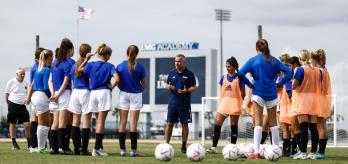Student-Coach mentoring aims to support the Student-Coach, with a view to enhancing their coaching practice. The process involves the following three core stages:
- Pre-session meeting: The Student-Coach and the Coach Educator discuss the session methodology and learning objectives, with the Coach Educator offering feedback prior to the start of the session.
- Session observation: The Student-Coach leads the session while the Coach Educator observes. If previously agreed the Coach Educator will give feedback during the observation.
- Post-session feedback: The Coach Educator provides the Student-Coach with valuable feedback on their session.
Pre-session meeting
The mentoring process begins with Douglas and Peacock coming together for a pre-session meeting, in which the aim is to prepare for the practical assessment. During the pre-session meeting, the Coach Educator should:
-
Connect with the Student-Coach and create a positive learning environment;
-
Use effective questioning to check for understanding and encourage critical thinking; and
-
Encourage the Student-Coach to plan and prepare for various eventualities.
Session observation
During the session, the Student-Coach uses a whole-part-whole approach that begins with a game. The session then moves into a ‘part’ practice that involves a passing activity. Finally, the Student-Coach returns to the game, in which the objective is to consolidate the learning. The Coach Educator’s role during the session is to observe the Student-Coach, with a view to providing feedback during the post-session debrief. Support can also be provided during the session if agreed prior to the session.
Feedback
Post-session feedback is critical to supporting the Student-Coach’s development. In order for this debrief to be effective, the Coach Educator should create a positive learning environment in which the Student-Coach welcomes the feedback and participates actively in the discussion. In the following video, we see how Peacock skilfully provides feedback whilst encouraging Douglas to reflect and problem-solve.
Learning framework: GRIP
During the mentoring process, the Coach Educator aims to provide instructional guidance to the Student-Coach and facilitate their self-reflection. When reflecting on the session, the Coach Educator offered crucial advice to the Student-Coach regarding the optimal timing for intervention and support when players were forcing passes. Additionally, both reflected on aspects such as session organisation and the area size. Concluding the feedback session, the Coach Educator further supported the Student-Coach in devising strategies to enhance future sessions.
As a Coach Educator you should aim to:
-
Create a positive learning environment and connect with the Student-Coach;
-
Provide evidenced feedback;
-
Reinforce good practice; and
-
Encourage the Student-Coach to think critically and problem solve.











